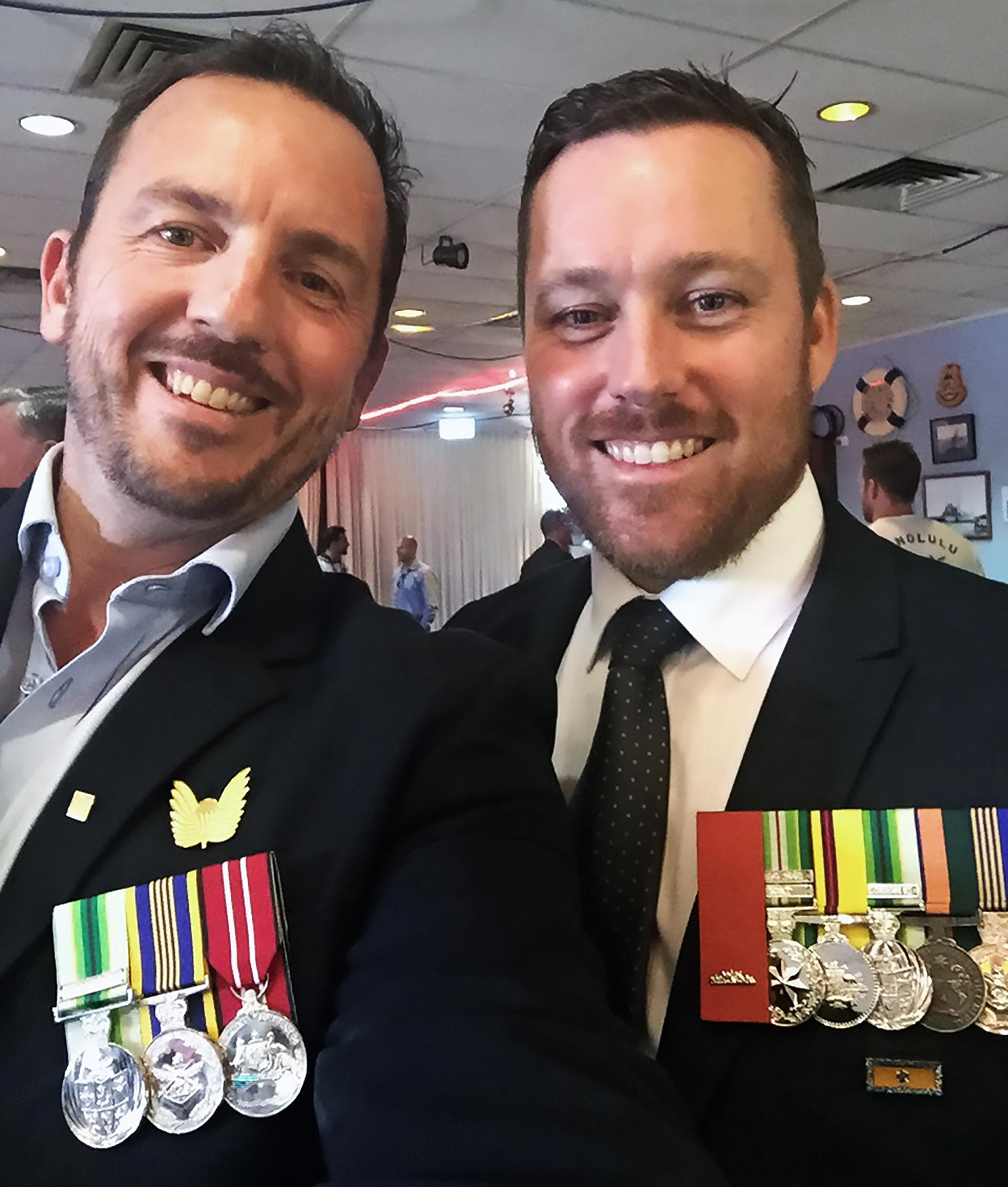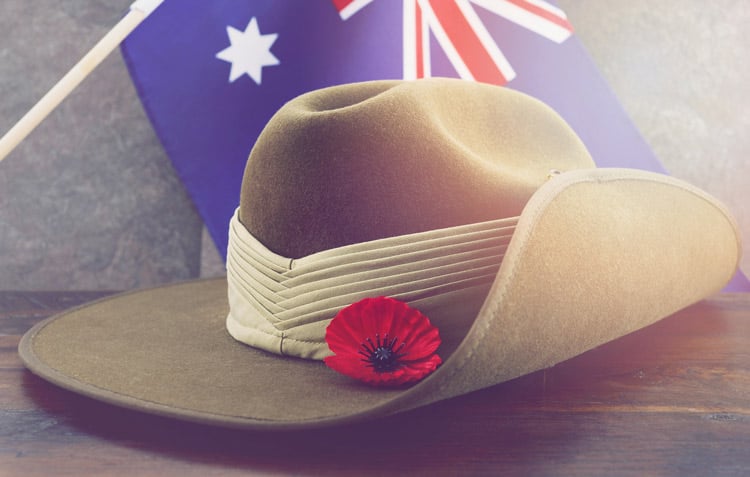Introduction
Brunel Australasia recently spent time speaking with our General Manager - Wellbeing, Safety & Health, Jason Dunn, about his views on Anzac Day and his own background serving in the Australian Defence Force. Jason (pictured below right, with fellow diver Mark Lowry on his left) had much to share about the purpose of the day and how we can show our respect under the current social isolation requirements.
What is your background in defence?

I spent 15 years serving in the Australian Defence Force. I started out in the Royal Australian Air Force in 1990, then after four years trained to become a navy clearance diver and served in the Royal Australian Navy from 1994-2004. During that time I was in a variety of mine counter-measure and maritime tactical operation units with Australian Clearance Diving Teams 1, 3 & 4 - serving in Sydney, Perth, Australia’s northern coastline, Asia, the Antarctic region, Solomon Islands and eventually Kuwait and Iraq. It involved everything from border protection, training with allied diving units including US Navy Seals and US EOD units, and a lot of diving. I eventually left in 2004 to become an Air Marshall with the Australian Federal Police, then after a further seven years I moved into civilian health, safety and risk management.
What does Anzac Day mean to you?
For me Anzac Day is mainly about recognising the generations who served in the defence force before my era. I guess the main reason for that, is that my service was a choice – which is not to say that people who voluntarily put themselves in harm’s way for their country aren’t deserving of recognition – but for me, Anzac Day is very much about generational recognition and respect for the people who came before us and what they endured across conflicts like the first and second world wars, Vietnam and Korea. The quality of life we have in this country today is directly linked to the sacrifices previous generations made in those conflicts, and having seen what some other parts of the world are like while serving, believe me when I say that we have an awful lot to be grateful for here in Australia.
When I think back on some of the more intense periods of my own time serving, I can’t help but wonder what it would have been like if I had been 16 instead of 30. That hit home for me when I was sitting in a desert in northern Kuwait with missiles landing bedside me. It seemed unbelievable to me that anyone could cope with that without the years of training and preparation I’d had, and the balance and resilience that only really comes with age.
Anzac Day is also a really good prompt for me to check back in with the people I served with and make sure they are doing okay. There are friends I served with who are no longer with us, and it’s an important day to stop, think about them and pay my respects for their sacrifices.
Ultimately it’s about being grateful for the country we have and showing our respect to all of those that contributed to making our way of life possible.
What do you normally do on Anzac Day?
It’s a pretty full day. Usually, Anzac Day will start with a local dawn service which I’ll attend with my family. After that I’ll head into Perth where I’ll march with the RANCDA (Royal Australian Navy Clearance Divers Association) in the Anzac Day parade. Then RANCDA have a get together in Fremantle – that’s a pretty big event with all of the past and present clearance divers. The clearance diving fraternity is quite small and close, so that’s where I really get a chance to check in with everyone, have a couple of beers, tell some stories and see how everyone is doing. I eventually left in 2004 to become an Air Marshall with the Australian Federal Police, then after a further seven years I moved into civilian health, safety and risk management.
What will you be doing this Anzac Day?
Because of all of the COVID-19 restrictions, Anzac Day this year is going to be very different. My interactions will be mainly via texts and a few one-to-one phone calls. I don’t think we’ll be video conferencing!
The campaign encouraging people to participate in dawn services from their homes is a fantastic initiative. Getting everybody out to the end of their driveway or balcony or farm gate at 6am and participate in the service over the radio is a strong way to show those older generations which served, that they haven’t been forgotten. Whether they see it from the end of their own driveway or later on when it’s relayed on the news, it’s important that they know people still care and that their sacrifices are still remembered despite the need for social distancing.
It is important to remember that many older people already deal with some level of age-related isolation, which is then being further exasperated by the coronavirus situation. We should be doing everything we can to make sure that older Australians, whether they served or not, don’t feel like the world has forgotten them and what they endured
How do you feel about Anzac Day 2020 being observed differently?
Look, there have been times in the past where I’ve missed physically attending Anzac Day events because of travelling for work. The first time that happened, I really felt it, but I guess as long as you are stopping and thinking about the day, then you’re following through on the most important part. I will miss seeing some of the people that I’d normally spend time with on the day, but I’ll make sure I check in with them somehow.
What would you like people to reflect on this year?
Families. I feel that the role they play and what they sacrifice when someone who is central to their world serves in the defence force, can go forgotten. Working closely with the mining and oil & gas industries, we know that extended periods of weeks apart can take their toll on workers and their families. When we talk about the defence force, that might be a 6 or 12-months apart – possibly with limited communication. The time those families spend separated is an important part of what is sacrificed when someone serves in the defence force. Knowing this, part of what we show our respect and offer our thanks for on Anzac Day should be what is being given by the children, spouses and extended families of those who serve.

About Anzac Day
Anzac Day falls on the 25th of April each year. The term 'ANZAC' stands for Australian and New Zealand Army Corps. It was the name given to a combined force of First Australian Imperial Force and New Zealand Army troops who landed on Turkey’s Gallipoli Peninsula at around dawn on Sunday, the 25th day of April, 1915 during World War I. Anzac Day was first commemorated in 1916 and with time has expanded to recognise and remember all those who have lost their lives in the service of their country. For more information visit www.awm.gov.au/commemoration/anzac-day

